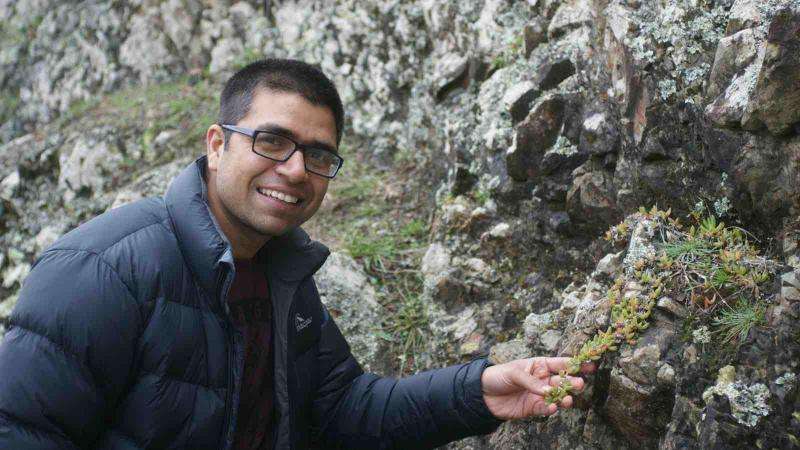Wellington coastal plant could hold key to improving crop resistance

A chance observation along Wellington's south coast has led a Victoria University of Wellington PhD student to make a scientific breakthrough that could change the way other countries deal with increasingly saline soils devastating traditional crops.
Plant biology PhD student Gagandeep Jain was collecting plant samples along Red Rocks when he noticed specimens of a native New Zealand iceplant (Disphyma australe) had differing levels of red pigmentation, which varied according to the plant's distance from shore.
Gagandeep suspected red pigments, called betalains, in the plants indicated an ability to withstand salinity. Salt is toxic to many plant species, and in some countries, increased salinity in soils is limiting the production of traditional agricultural crops such as wheat and corn.
After six months of testing chemical components of the green, red and variegated iceplants, Gagandeep discovered his theory was correct.
"Red pigments act like a shield," he says. "They protect plant tissues from the damaging free radicals that are formed when plants experience the combination of salt and strong sunlight."
Gagandeep's research shows when red pigments are transferred to green-leaved iceplants, they too became tolerant to salt, demonstrating the saline-protecting properties can be adopted by other specimens, even when not naturally produced.
Victoria University's Professor of Plant Biology Professor Kevin Gould says Gagandeep's research could help change the current direction of science investigating how to make crops more resistant to increased saline levels.
Professor Gould says large tracts of agricultural land in Australia, Africa and India have become unusable due to increased salt levels in the soil.
"There is concerted scientific effort worldwide to genetically engineer crops with improved tolerance to salt. Remediating saline soil is possible, but it's expensive and temporary.
"Gagandeep's work suggests there may be an alternative strategy. If it is possible to introduce genes into a crop plant so that it makes betalain, then traditional crops might once again be harvestable on this land," he says.
Gagandeep's research has recently been published in the science journal New Phytologist. He hopes to further his research by examining whether the enzyme responsible for saline protection can be transferred to other plant species.
Journal information: New Phytologist
Provided by Victoria University of Wellington


















